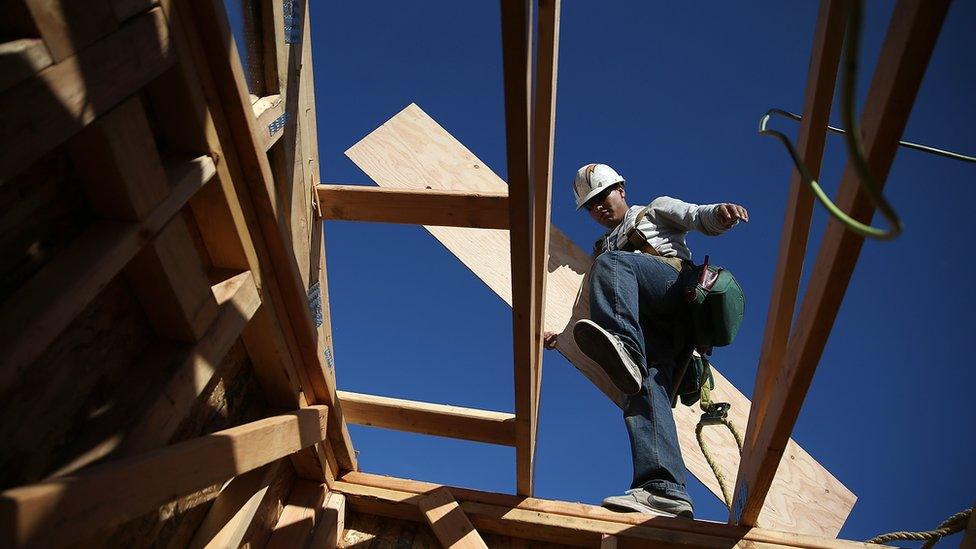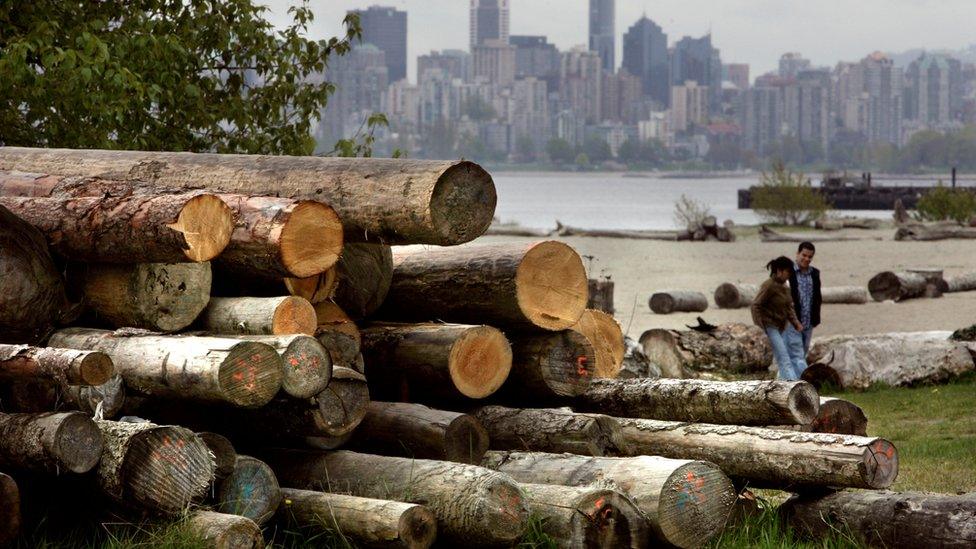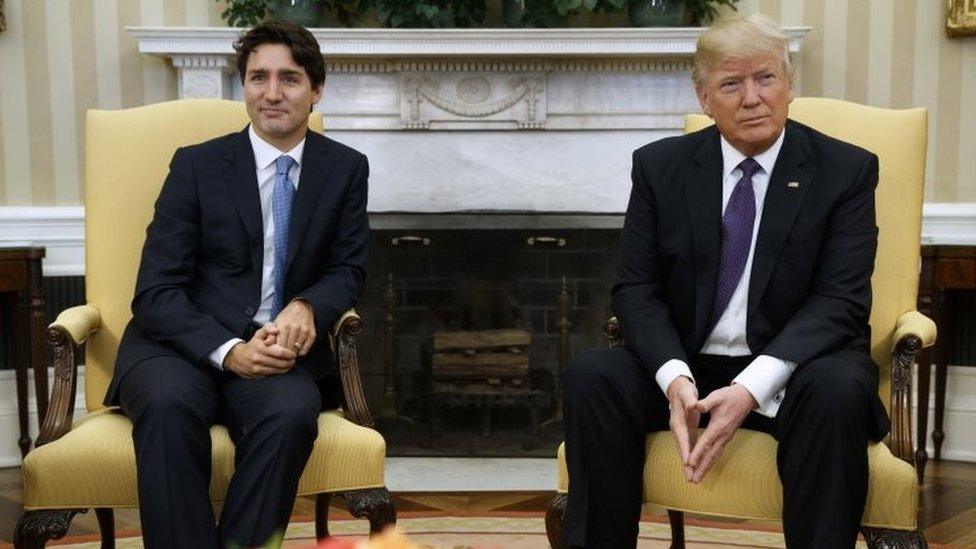Has the US started a lumber trade war with Canada?
- Published

Softwood lumber is used mainly in homebuilding
The United States is slapping hefty new tariffs on the import of Canadian softwood lumber.
The US Commerce Department says that Canada is improperly subsidising its exports of the forestry product.
This is just the latest volley in the long-running lumber trade dispute between the two countries.
It also comes during a sensitive time in US-Canada trade relations, with North American Free Trade Agreement (Nafta) talks on the horizon.
US President Donald Trump has been sending Canada mixed messages on trade, initially offering assurances that Nafta will only need "tweaks" but recently singling out Canada's softwood lumber and dairy industries for criticism.
As US Commerce Secretary Wilbur Ross said in a statement: "It has been a bad week for US-Canada trade relations."
Canada is "generally a good neighbour but that doesn't mean they don't have to play by the rules," he later said.
Canadian Prime Minister Justin Trudeau says his job is to stick up for Canada's interests.
Here are five things to know about the Canada-US softwood lumber spat.
What are the most recent developments?
The US has claimed for decades that Canada is unfairly subsidising its lumber industry by charging minimal fees to log public lands.
On Monday, the US Commerce Department imposed an overall 20% tariff on Canadian softwood lumber.
In this "preliminary determination", five exporters each face specific countervailing duties, external, which are meant to level the playing field between domestic producers and government-subsidised foreign producers of a product, ranging from 3.2% to 24.12%.
The US Commerce Department valued softwood lumber imports from Canada at US$5.6bn (C$7.6bn/£4.3bn) in 2016.
The duties will amount to about US$1bn, according to Secretary Ross.
This comes after no breakthrough was reached in recent talks in the decades-long dispute.

British Columbia is Canada's biggest logging province

A safe fight to pick - John Mervin, BBC Business, New York
President Trump is finding it difficult to turn campaign rhetoric into government action in in many arenas, but particularly so in overseas trade.
He won the presidency, in part, with a strong and simple message of "winning" trade deals and being "tough" with the US's biggest trading partners. In the real world, that turns out to be a risky approach.
The president has notably declined to follow up on any of his harsh rhetoric about China, for example. Nevertheless he needs some way of showing how he can be tough. A dust up with Canada about lumber is probably a safe fight to pick. The lumber business is worth a fraction of the overall trade with Canada and set against so much shared history and thousands of miles of border, it's hardly likely to undermine US-Canadian relations on its own.
However it doesn't auger well for a smooth renegotiation of the North America Free Trade Agreement if that's really what President Trump wants.

What is the response?
Mr Trudeau spoke on Tuesday evening with Mr Trump and said afterwards that Canada would "vigorously defend" its softwood lumber industry.
Natural Resources Minister Jim Carr and Foreign Affairs Minister Chrystia Freeland said in a joint statement that Canada "disagrees strongly" with what they called "an unfair and punitive duty".
Mr Trudeau said on Tuesday that "you cannot thicken this border without hurting people on both sides of it".
Susan Yurkovich, president of the British Columbia Lumber Trade Council, said in a statement that "these duties are unwarranted, and this determination is completely without merit".
The province is the the largest Canadian exporter of softwood lumber to the US.
But the decision was cheered by the US Lumber Coalition, an alliance of American lumber producers formed in 1985 to fight what it calls the "devastating effect of Canada's lumber subsidies" on their industry.
Meanwhile, the US National Association of Home Builders denounced the decision as "short-sighted" and warned it would increase the cost of housing in the US. Secretary Ross said it will only have a small impact.
Softwood lumber products, like pine, fir and spruce, are mainly used in the construction of single family houses.

In 2002, former US President George W. Bush (R) and former Canadian Prime Minister Jean Chretien also dealt with the softwood lumber spat
What is the backstory?
Minister Jim Carr quipped on Tuesday that lumber disputes have been "the most significant trade irritant between the US and Canada since Confederation" 150 years ago.
This specific dispute, however, dates back over 30 years to the early 1980s, when a group of US lumber producers first called for countervailing duties on Canadian softwood.
As a result of a series of disputes in the intervening years, the first US-Canada Softwood Lumber Agreement - a five year deal - was signed in 1996.
Soon after that deal expired, the US lumber industry petitioned Washington to impose duties on softwood lumber imports.
In 2002, the US imposed those tariffs.
In 2006, Canada and the US reached a second Softwood Lumber Agreement for a seven-year term, under which the US scrapped the duties and Canada imposed taxes and quantitative restriction on lumber exports
That was extended until 2015, and the US government and industry agreed to not undertake any new countervailing or antidumping duty investigations for a year - that deal expired last October.
In November, the US lumber industry filed antidumping and countervailing duty cases under American trade laws, launching the fifth round in the lumber row.
What is the impact?
Both countries will feel a shock, with the US comprising almost 70% of Canada's softwood market.
There are about 600 mills across Canada producing softwood lumber and over 170 communities get 20% or more of direct income from that industry.
Minister Carr noted there were lost job and closed mills the last time the US imposed tariffs, and Ottawa is preparing for "tough times".
In the US, the renovation and construction industries are expected to feel the impact.
One-third of lumber used in the US last year was imported and the bulk - over 95% according to the US National Association of Home Builders - was Canadian.
The group estimates the recent 22% jump in the cost of softwood lumber in the US, caused by recent uncertainty around the product, has added almost US$3,600 to the price of a new home.
What's next?
Canada says it is interested in a "good faith resolution" in this dispute but will defend its interests including through litigation, though that was not immediately on the table.
Minister Carr noted Canada has prevailed in previous rounds of litigation "and we will do so again" but also said he believes that the trade relationship is so consequential for both countries that "we will work through this".
Canada is also seeking to open new markets abroad, including in China.
In the US, a preliminary antidumping ruling is scheduled for 23 June, looking at whether Canadian lumber has been dumped in the US market. Dumping occurs when a company exports its product at a lower price than it charges domestically.
The US Department of Commerce is also expected to announce its final duty rates by late 2017.
- Published13 February 2017

- Published19 April 2017
